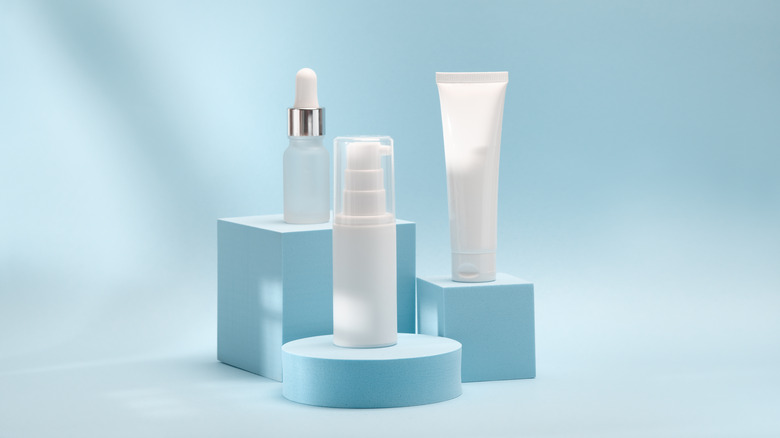What Is Skin Cycling And Should You Try It? - Exclusive
If the next time we went thrifting, a genie appeared out of an old lamp and offered to grant us three wishes, we'd be lying if we said we wouldn't at least flirt with the idea of wishing for eternally youthful and glowing skin. And we would venture a guess that we wouldn't be the only ones, considering that the global market for anti-aging cosmetics was valued at $38.62 billion in 2018 — a number that is expected to jump to over $60 billion by 2026 (per Fortune Business Insights).
Many of us go to great lengths to keep our skin happy and healthy. We apply lotions and potions like our confidence depends on it, because, let's face it — the only thing that feels better than a good hair day is a great skin day. But when it comes to anti-aging products, the old adage "too much of a good thing" can apply. That's why Peter Young, MD, Medical Director at Facet, recommends skin cycling, which according to him is "a method of rotating your skincare products throughout the week so you don't over-exfoliate or damage your skin."
In an exclusive interview with Health Digest, Dr. Young details the benefits of skin cycling and gives us his pro tips for the best products to cycle in and out of your daily skincare regimen, so you can achieve all your skincare dreams — sans genie.
Doctor-recommended practices
On average, NPD reports that American women use five skincare products each day. While Dr. Young acknowledges the appeal of product layering, he offers this gentle reminder: "When it comes to skin care, slow and steady wins the race. Using too many products on your skin, especially anti-aging products, can cause irritation, and actually make you look older. Therefore, It's best to space out active ingredients like retinoids and exfoliants in your weekly skincare routine."
For skin-cycling newbies, Dr. Young explains, "A good nightly skin care routine involves cycling between one night of using retinoids (e.g., tretinoin or retinol), followed by one night of using exfoliants (e.g., glycolic acid or salicylic acid), followed by one night of using plain moisturizers without any active ingredients." And always start your nightly routine by washing your face with a gentle face cleanser. "The dermatologists at Facet designed our Face Cleanser, available this fall, to be the perfect complement to your everyday skin regimen, and it fits in very nicely with the three-day skin cycling routine," says, Dr. Young. He suggests that Cerave, Cetaphil, and Vanicream offer great over-the-counter cleansers as well.
The best products for skin cycling
According to Dr. Young, "Retinoids and exfoliants help reduce the appearance of fine lines and wrinkles. They also brighten your complexion, unclog your pores, and give your skin a healthier and more youthful appearance." When it comes to retinoids, either prescription-strength tretinoin or over-the-counter retinol products will do the trick. "Facet's Custom Rx Formula for Anti-Aging is a prescription treatment that blends three powerhouse anti-aging ingredients — tretinoin, niacinamide, and azelaic acid — to maximize your results," says Dr. Young. If over-the-counter is more your speed, he endorses Neutrogena's Rapid Wrinkle Repair Retinol Regenerating Cream.
When it's time to exfoliate, he points to SkinCeuticals Glycolic 10 Renew Overnight Cream, and when rest day rolls around, Dr. Young explains that Facet Daily Repair Night Cream can't be beat. "Facet Daily Repair Night Cream was designed by our dermatologists with all skin types in mind, including acne-prone and more sensitive skin associated with conditions like rosacea and eczema. Facet specifically chose powerhouse ingredients including hyaluronic acid, niacinamide (Vitamin B3), and jojoba oil to make this a gentle moisturizer that hydrates and replenishes your skin overnight."
Expert skincare tips
Because skincare products can cause a reaction, Dr. Young says it's important to test new products before applying them to the face. "To test a product, apply a small amount to your inner forearm twice a day for four to five days. If your skin looks normal and is free of any redness, itching, and other reactions, then you can apply it to your face." Stinging, burning, itching, and redness are never normal reactions, so stop use immediately if you experience any such symptoms.
And don't forget sunscreen! Skincare starts with sun protection, and for that reason, Dr. Young suggests, "Protect your skin from the sun by using a broad-spectrum sunscreen with SPF of at least 30 every day. Make it part of your morning routine, like brushing your teeth. Sun protection reduces premature aging of your skin, including fine lines, wrinkles, and age spots. It also reduces your risk of getting skin cancer. Facet's Daily Moisturizer + SPF 35 is an excellent choice for your daily sunscreen."
Recognizing that we're all eager for a great skin day, every day, Dr. Young implores us to employ diligence. "Be patient and give your skin care products time to work. Most products take two to three months to start working. Once you see improvement, continue using your products. People often make the mistake of stopping their products once they see results."
To learn more about Facet and shop the Facet products recommended by Dr. Peter Young, head to Facetcare.com.




